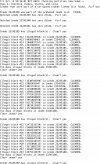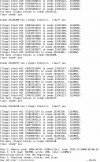Black Hole
May contain traces of nut
I seem to have total failure of the WebIF on my HDR4. It normally just sits there recording and decrypting radio programmes and then converting them to MP3 for later consumption in the car, accessed by SMB but also occasionally by WebIF. The other day I noticed the RS service hadn't "seen" HDR4 for over a year, so I set about investigating.
I fired up WebIF Diagnostics and ran fix-flash-packages for good measure, then rs/sync, to no apparent effect. rs/checkin claimed there was no service. Things went downhill from there: WebIF Package Management claimed there were no packages installed, nor any available. Then the main WebIF page worked but wouldn't open any sub-pages. Then all I got from the WebIF IP address was a directory.
I've tried rebooting, but now I get the reinstall page. So far as I can see, the HDR itself is functioning normally. Obs I had better run fixdisk, and thanks to webshell I can do that on my iPad...
I fired up WebIF Diagnostics and ran fix-flash-packages for good measure, then rs/sync, to no apparent effect. rs/checkin claimed there was no service. Things went downhill from there: WebIF Package Management claimed there were no packages installed, nor any available. Then the main WebIF page worked but wouldn't open any sub-pages. Then all I got from the WebIF IP address was a directory.
I've tried rebooting, but now I get the reinstall page. So far as I can see, the HDR itself is functioning normally. Obs I had better run fixdisk, and thanks to webshell I can do that on my iPad...




 .....
.....